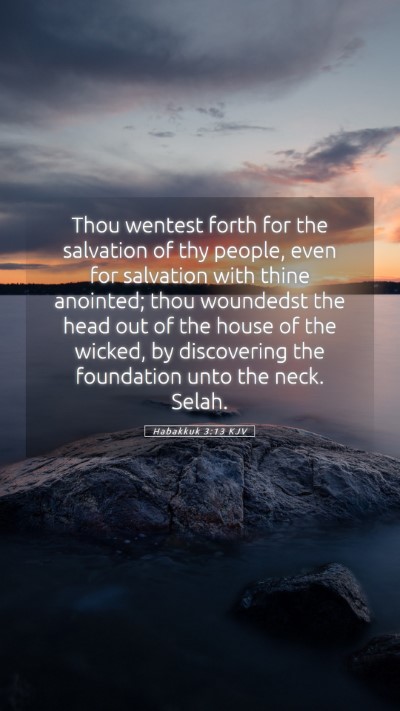Old Testament
Genesis Exodus Leviticus Numbers Deuteronomy Joshua Judges Ruth 1 Samuel 2 Samuel 1 Kings 2 Kings 1 Chronicles 2 Chronicles Ezra Nehemiah Esther Job Psalms Proverbs Ecclesiastes Song of Solomon Isaiah Jeremiah Lamentations Ezekiel Daniel Hosea Joel Amos Obadiah Jonah Micah Nahum Habakkuk Zephaniah Haggai Zechariah MalachiHabakkuk 3:13 Meaning
What is the meaning of Habakkuk 3:13?
Thou wentest forth for the salvation of thy people, even for salvation with thine anointed; thou woundedst the head out of the house of the wicked, by discovering the foundation unto the neck. Selah.
Habakkuk 3:13 Bible Verse Meaning
Understanding Habakkuk 3:13
Bible Verse: "Thou wentest forth for the salvation of thy people, even for salvation with thine anointed; thou woundest the head out of the house of the wicked, by discovering the foundation unto the neck." (Habakkuk 3:13)
Overview of Interpretation
Habakkuk 3:13 encapsulates themes of divine salvation and judgment. In this verse, the prophet reflects on God's actions aimed at liberating His people, particularly through the anointed one. The imagery of wounding the head of the wicked emphasizes God’s ultimate authority over evil and His role as a warrior for His people.
Commentary Insights
- Matthew Henry: Henry describes this verse as a declaration of God's purpose to save His chosen people. The phrase "thou wentest forth" suggests a proactive God who intervenes on behalf of His people. The use of "thine anointed" reflects the messianic expectation, pointing toward Christ, who fulfills salvation.
- Albert Barnes: Barnes emphasizes the metaphor of wounding the head as a symbol of defeating the wicked. He explains that this imagery illustrates God's power to dismantle the strength of evil and bring justice. Barnes also notes that this verse connects to God's overarching plan of redemption.
- Adam Clarke: Clarke dives into the historical context, reflecting on God's past interventions during Israel's struggles. He suggests that this verse demonstrates both God's mercy and the severity of His judgment against oppressors. Clarke highlights the emotional resonance of God's promise to deliver His people when they turn to Him.
Key Themes
- Divine Salvation: The core message of the verse is God's commitment to save His people, mirroring a frequently seen theme throughout the Bible.
- Judgment of the Wicked: The violent imagery serves to show the seriousness of divine justice, signifying that God does not overlook sin but actively deals with injustice.
- Messianic Prophecy: It hints at an anointed figure, which invites reflection on the New Testament revelation of Jesus Christ as the true anointed one.
Application to Daily Life
Believers can take comfort in knowing that God is actively involved in their salvation and is against all forms of evil. This inspires faith in God's promises and encourages individuals to trust in His timing for justice and deliverance.
Related Bible Verses
- Isaiah 63:1-6: God's mighty acts for the salvation of His people.
- Psalms 44:3: A reminder that it is God who grants victory and not human effort.
- Micah 5:4: A prophecy about the shepherd who will stand and feed His flock, symbolizing leadership and protection.
- Hebrews 10:31: A warning that it is a fearful thing to fall into the hands of the living God.
- Revelation 19:11-16: Portraying Christ as the divine warrior who brings ultimate justice.
Conclusion
Habakkuk 3:13 is rich in meaning and offers profound insights into God’s character as both savior and judge. For those dedicated to Bible study, this verse invites deep reflection and encourages a closer relationship with God. Understanding this passage can enhance Bible verse meanings and aid in the comprehension of scriptural themes related to salvation and righteousness.


